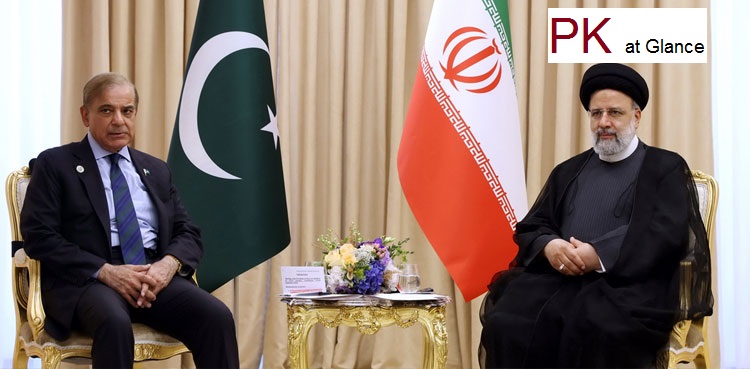 |
| Image Credit: ARY |
M. Adil Javed
1. What are the prospects for improved relations between Pakistan and Iran?
President
Raisi's visit presents a significant opportunity to improve relations between
Pakistan and Iran. Both countries share historical, cultural, and religious
ties, providing a strong foundation for enhanced cooperation.
By addressing
common challenges such as terrorism and exploring avenues for economic
collaboration, there is optimism for a positive trajectory in bilateral
relations between the two Islamic countries.
2. How does President Raisi's visit impact regional dynamics?
President
Raisi's visit to Pakistan has broader implications for regional geopolitical
and strategic dynamics. It can potentially signal a commitment to dialogue and
cooperation among the two neighboring countries, which is seen and expected as
crucial for stability and development in the region.
So, the
discussions to be held during the visit can contribute to regional peace and
security, fostering a more collaborative approach to addressing shared
challenges.
3. What role does the United States play in the context of this visit?
The United
States has been monitoring developments related to President Raisi's visit to
Pakistan. Its reactions and statements reflect a broader interest in regional
stability and constructive engagement among all stakeholders.
While each
country pursues its interests, there is a recognition of the interconnectedness
of regional dynamics and the need for inclusive dialogue.
However, addressing
a news briefing in Washington Vedant Patel, Principal Deputy Spokesperson of
the U.S. State Department said that as it relates to any visits that other
foreign ministers or leaders might have, “I will let their governments
comment on that specifically.” ARY reported.
4. What are the potential outcomes of President Raisi's meetings with Pakistani leaders?
President
Raisi's meetings with Pakistani leaders hold the potential for substantive
discussions and agreements on various issues of mutual interest. These could
include economic partnerships, security cooperation, cultural exchanges, and
initiatives to address common challenges. The outcomes will likely shape the
trajectory of Pakistan-Iran relations in the coming months.
5. How does this visit contribute to efforts to combat terrorism in the region?
One of the key
agendas of President Raisi's visit is to discuss bilateral cooperation in
combating terrorism. By aligning their efforts and sharing intelligence,
Pakistan and Iran can strengthen their defenses against extremist threats.
This
collaborative approach is essential for promoting peace and stability not only
in their respective territories but also in the broader region.
6. How does President Raisi's visit contribute to regional economic cooperation?
President
Raisi's visit to Pakistan is expected to bolster regional economic cooperation
in several key areas.
Discussions on
trade, connectivity, energy projects like the Iran-Pakistan gas pipeline, and
agricultural partnerships can pave the way for increased economic
collaboration.
This can lead
to mutual benefits and contribute to the economic development of both countries
and the wider region.
7. What are the expectations regarding the outcomes of President Raisi's visit for Pakistan's energy sector?
One of the
significant expectations from President Raisi's visit is progress in the energy
sector, particularly regarding the Iran-Pakistan gas pipeline project.
Strengthening
energy cooperation can help address Pakistan's energy needs and contribute to
energy security in the region. The visit may lead to discussions on enhancing
existing energy agreements and exploring new avenues for collaboration in this
critical sector.
8. How does this visit impact cultural and people-to-people exchanges between Pakistan and Iran?
President
Raisi's visit provides an opportunity to strengthen cultural ties and promote
people-to-people exchanges between Pakistan and Iran.
Cultural
diplomacy plays a vital role in fostering understanding and goodwill between
nations. Through cultural events, educational exchanges, and tourism
initiatives, both countries can enhance mutual understanding and promote
cultural diversity.
9. What role does Pakistan-Iran cooperation play in regional security?
Pakistan and
Iran share common security challenges, including terrorism and border security
issues. Cooperation between the two countries is essential for addressing these
challenges effectively.
Joint efforts
in intelligence sharing, border management, and counterterrorism strategies can
contribute significantly to regional security and stability.
10. How does President Raisi's visit align with Pakistan's foreign policy objectives?
President
Raisi's visit aligns with Pakistan's foreign policy objectives of strengthening
relations with neighboring countries, promoting regional cooperation, and
enhancing economic partnerships.
The visit reflects
Pakistan's commitment to engaging constructively with its neighbors and
pursuing diplomatic initiatives to address shared challenges and promote peace
and prosperity in the region.
11. How can Pakistan and Iran collaborate to address regional security threats effectively?
Collaboration
between Pakistan and Iran in addressing regional security threats requires a
multifaceted approach. This includes intelligence sharing, joint border management
initiatives, coordinated efforts against terrorist groups, and diplomatic
engagement to promote regional stability.
Both countries
can leverage their strengths and resources to contribute positively to regional
security dynamics.
12. What are the long-term implications of President Raisi's visit for Pakistan-Iran relations?
The long-term
implications of President Raisi's visit for Pakistan-Iran relations depend on
the outcomes of discussions, agreements reached, and follow-up actions taken.
Positive outcomes
could lead to a deepening of bilateral ties, increased collaboration across
various sectors, and a more robust partnership between the two countries. This,
in turn, can contribute to regional stability, economic growth, and mutual
prosperity.
The writer has
an academic background of Politics and International Relations

Post a Comment